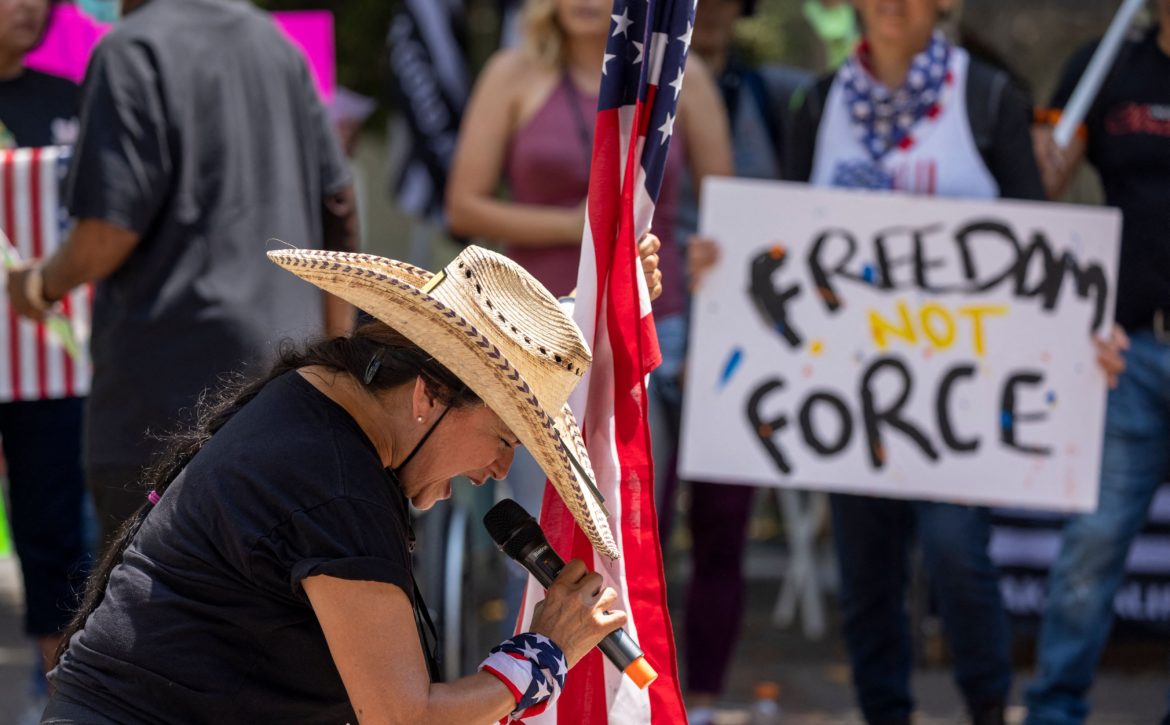
The Baffling Legal Standard Fueling Religious Objections to Vaccine Mandates
As vaccine
mandates begin to take effect, thousands of Americans are scrambling to get
religion. For those who oppose vaccination, a “sincerely held religious
belief” might be the only way to avoid getting the shot—or losing their job.
Online, one can find dozens of official-looking forms, letter templates, and
tips on how to explain why your anti-vaccination beliefs are both sincere
and religious. Some people are even attempting to turn the
exemption business into a lucrative side hustle.
Leaders of many major religious organizations and denominations have released
statements supporting vaccination and clarifying that their teachings, official
and unofficial, do
not oppose vaccination. But some are offering “exemption
letters” to parishioners who want a minister’s religious authority backing
them up. Soon enough, the
courts likely will have to start sorting out this chaotic mess. But whether or not an opponent of vaccination
has a letter from a pastor or can cite long-standing religious doctrine to back
up their claim won’t necessarily matter. While an endorsement from a religious
group or a commitment to religious orthodoxy certainly can help someone get
recognized as sincere and religious, as far as the legal system is concerned, those
factors are not necessary. Religious beliefs are for individuals to
hold—sincerely.It is a strange
standard. To be a sincere believer in the United States—that is, to be
recognized by the law as truly religious and thus deserving exemption and
accommodation and protection—one does not have to be “traditionally” religious.
You don’t have to belong to a church. And if you do, you don’t have to agree
with that church’s leaders or its official teachings or the person sitting next
to you. You don’t even have to believe in a god.So,
why is “sincerely held religious belief” the standard for exemption? The
circuitous legal history of this idea can be traced to the mid-twentieth
century. The first key case was U.S. v. Ballard,
in 1944. Leaders of a movement called the “I AM” movement
were arrested for fraud, since their religious literature solicited donations
and made claims that were not true (including, notably, that their founder, who
died in 1939, was immortal). The Supreme Court decided that it was a messy
business wading into theological matters. It was not the place for a secular
court to say whether religious beliefs were true. Instead, it would
test only whether the claimants sincerely believed them. What about beliefs that are not traditionally
religious? When is a belief religious, as opposed to philosophical or political
or something else? Judges, bureaucrats, and others have had to answer and
reanswer those questions on a case-by-case basis for generations. Since the
1960s, most claimants have received a lot of leeway, and the “religious” has
become a quite capacious category.U.S. v. Seeger was a pivotal case. In that 1965 case,
the Supreme Court decided that a religious belief, even if it was unorthodox
and nontheistic, was genuinely religious if it occupied “a place parallel” to
that of a traditional believer. According to this theory, everyone
is or at least has the capacity to be religious—and religious beliefs are not
about their content so much as how they are believed—deeply, sincerely,
religiously.The
Seeger case helps explain not only why “religious” can be such a broad
category but also why it is essentially a matter of individual belief. It was
one of many cases involving conscientious objection—best known as the claims
made by individuals to a right to refuse to perform military service on
religious grounds—that found their way into the courts from the 1940s through
early 1970s. Prior to 1940, to become a conscientious objector in the U.S., one had to belong to a “historic peace church” such as the Quakers or
Mennonites. But in 1940, Congress changed the requirement, so that war
resisters were only required to object based on “religious training and
belief.” After a number of vexing
cases,
Congress attempted
to clarify the requirement in 1948. “Religious training and belief” meant “an
individual’s belief in relation to a Supreme Being involving duties superior
to those arising from any human relation, but does not include essentially
political, sociological, or philosophical views or a merely personal moral code.”
In short, religious beliefs were a special kind of belief, separate from the
realm of politics and economy, having something to do with a “Supreme Being.”
And while they are to be held by individual believers, they are not “merely
personal.”If
that clarification does not seem particularly clear to you, you’re not alone.
The whole draft system, from local boards to the federal judiciary, struggled
to interpret and apply this statute. Eventually, in Seeger, a test case
reached the Supreme Court. Daniel Seeger did not believe in a Supreme Being and
did not belong to a church. But he had what he called a “religious belief in a
purely ethical creed.” It was religious not because it was about a god
or related to denominational teachings but because it was not a political
opinion or sociological conclusion, nor was it some idiosyncratic “merely
personal” idea. It was sincere and deep. The court considered this carefully.
They admitted that the “Supreme Being” requirement, if it were interpreted
strictly, would exclude lots of authentically religious believers, like
Buddhists. Taking as generous an interpretation as they could, the court
unanimously decided that Seeger’s beliefs were indeed religious.When
people apply for a religious exemption from a Covid-19 vaccine, they are
stepping into a legal world shaped by Seeger. Even though that case was
technically just about interpreting the draft act, it quickly began to
influence religious freedom in many other arenas. For example, when the Equal
Employment Opportunity Commission evaluates these kinds of claims, it uses ideas and language derived from Seeger.With the rapid
rise in requests for vaccine exemptions, many people are realizing for the
first time just how flexible these standards can be. When an employee sends you
a letter claiming that their religious belief prevents them from receiving a
vaccine, what do you do? If you are a school administrator and a parent writes
a letter, perhaps co-signed by a pastor, stating that their child cannot wear a
mask due to their sincere beliefs, how can you respond? What mechanisms are
there to determine whether these are bona fide religious claims or whether
the claimants are truly sincere? The answer, until
now, tended to be that anything goes. Most employers and government bodies give
claimants the benefit of the doubt and find them to be sincere and religious.
That does not mean that every sincere belief is accommodated, however. Businesses
must make only “reasonable accommodations,” and thus they can deny a claim if
doing so would cause a significant burden to them. In governmental settings,
sincere belief will get you further, but there are still questions about how to
balance the “compelling
interest” of the government (in people having health care, for example) and
the importance of religious freedom. How does that calculus change when a large
number of people request the same exemption—and when those exemptions,
especially in great numbers, pose public health risks?Vaccine exemptions
are a stark case of what legal scholars call “third-party harm.” Typically, a
religious exemption or accommodation affects only a believer and the state. A
prison bans facial hair, but an incarcerated Muslim man wants to grow a short beard as an
expression of his faith and devotion. A state law requires formal education
until age 16, but an Amish child’s religious and family life
necessitate otherwise. Cases like these do not really affect anyone else.
It’s a different matter if, for instance, a person’s religious belief compels them
to violate anti-discrimination laws, deny
services to LGBTQ people, misgender
their students, or potentially spread a
deadly virus. The pandemic has
exposed many Americans’ lack of conception of or belief in the common good: the
inability or unwillingness to think of “freedom” as anything other than
something each individual must shore up and maximize for themselves in a
zero-sum game. These beliefs are not anathema to U.S. religion. In fact, for
many, there is a theology at the core of their view of freedom, responsibility,
and society. It is no coincidence that “sincerely held religious belief” has
become so prominent in recent years. It names a distinctly American way of
being free and being religious: as an individual, unsystematically, and
without regard for others.Thousands of
people have already filed for exemptions and, in the coming weeks and months,
thousands more will follow. Will their strategies work? No one seems to know
for sure. A labor
attorney told CBS that simply saying “I believe in God, I can’t get
vaccinated” is not sufficient: “There has got to be some kind of explanation
that’s better than that,” she said.That is probably
true. But what’s a “better” explanation? If someone cites biblical passages as
the source of their sincere belief that they should not wear a mask or receive
a vaccine—and they certainly appear to believe—how can we say they are not both
religious and sincere? Some scholars have
speculated that “false religious claims” will proliferate. The whole point
of “sincerely held religious belief,” since at least the 1944 Ballard
case, is that the state will not decide whether a religious belief is false.
So “false religious claims” are not claims that aren’t true but rather claims
that aren’t truly religious. Again, these are tricky waters to navigate,
because these are not tests of orthodoxy—or even coherence or consistency. Who will receive
exemptions? It’s useful to think about it from the perspective of a claimant.
Instead of asking how you would evaluate such a claim, think about how you
would make one. Would you know which words to use, how to craft your
argument, which court cases to cite and how to cite them? Do you know someone
who could help you?How these
questions get answered makes a big difference. Daniel Seeger, the conscientious
objector who was found to be sincere and religious despite his lack of
religious affiliation or belief in god, had a lot of help. The Central
Committee for Conscientious Objectors, as well as the American Friends Service
Committee (where Seeger was employed by the time his case made it to the
Supreme Court), helped Seeger through his case from the very start. He had the
best lawyers in the country. He cited theologians and spoke eloquently about
his “religious belief in a purely ethical creed.” The many
government agents involved in his case found him to be a sympathetic figure. But
many conscientious objectors who had similar beliefs did not fare so well. This
was especially true of Black
objectors, whom the peace movement and draft counselors tended to ignore, and whom the
draft boards often saw as political (because of their commitment to civil
rights) rather than religious.U.S. religious
freedom law tends to favor white Protestants. Claimants whose religions do not
fit cleanly into the framework of sincere individual belief—such as Native
Americans attempting to protect
their sacred lands—have a hard time winning religious freedom cases. White
Protestants have set the terms not only for what religion looks like but what
it is about. Beliefs about sex and gender are rarely challenged as “false
religious claims” because most people assume that religion is about sex and
gender in a way that it is not about race or politics or giving
water to migrants. Evangelical Protestants (and some Catholics) also have
access to the same sort of help that Seeger had: specialized lawyers willing to
take a case. Conservative Christian legal
organizations, such as Liberty Counsel and Alliance Defending Freedom, have worked for
years to reshape religious freedom law in favor of their clients. It is not clear
how effective most people will be in their quest for a religious exemption to
vaccination. On the one hand, if someone cites biblical passages as the source
of their sincere belief that they should not wear a mask or receive a
vaccine—and they certainly appear to believe—how can we say they are not both
religious and sincere? On the other, though, if someone’s citations make no
sense, if they can’t give a coherent or consistent
explanation to their employer, if they copied and pasted some exemption letter
from a Facebook page run by Russian bots, will the EEOC or the courts really
judge them favorably? Maybe. Receiving a
religious exemption requires legibility, and that takes some skill. You have to
be sincere and clear, not too “out there,” not too political. You must speak
from the heart as an individual. Hundreds of employees submitting the exact
same letter at the same time are unlikely
to succeed. If anyone is successful, it will be those with resources, those
whose style of religious belief and performance is recognizable and normative.
In other words, those who already fit the accepted model of the sincere religious
believer.
Read More


